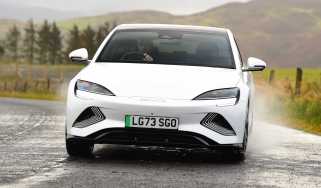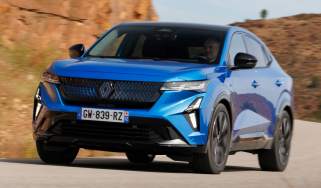Van running costs: keeping your van on the road for less
How can businesses keep van costs in check? We break down the outgoings and look at ways to save...
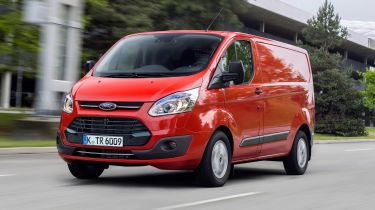
If you're someone who has to run a van as part of your business, you'll be well aware that it can be a costly exercise. Tax, fuel, maintenance, insurance, it all adds up to significant expenditure for any company, large or small. That's why it's so important for businesses to do whatever they can to minimise their van costs and there are a number of easy steps that can help achieve that goal.
Van manufacturers put a great deal of effort into making their ranges more cost-effective in all kinds of ways. Fuel economy is just one factor to consider when it comes to running a van but it's a big one. The latest models reach new standards both of efficiency and in terms of controlling emissions - with the positive knock-on effect that has in terms of lowering the tax burden.
• Van accessories: choosing the right extras for your van
If you do high mileages in you van, and even if you don't, servicing and repairs to the vehicle will be another important consideration. The latest models are designed to have long service intervals and to be easy to repair quickly, so the amount of time the van spends off the road is reduced. Then there's the cost of insurance, which operators can control by choosing the right vehicle and being selective about the insurance company they use.
In this feature, we cover all of the associated costs of running a van or pick-up truck in the UK, giving you a heads-up on what you can expect, and how exactly you can cut your costs in every area. Whether you're thinking of buying a new van or if you want to cut the costs of running your existing work vehicle there'll be something below for you....
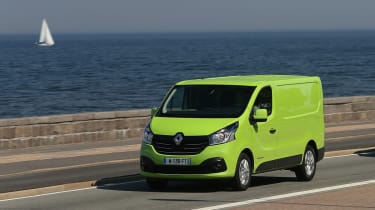
Picking the right van for the job
If you don't choose the right van for the job in the first place, then you'll simply be wasting money on a daily basis. Step back and ask yourself: What exactly do I need a work vehicle for?
Is carrying capacity the be-all and end-all of your van choice? What about fuel economy, cabin space and load heights? Does it matter if your van can swallow two Euro pallets - manufacturers make big noises about this kind of capacity, but is that something you've ever needed to consider in your line of work?
Is van size an important factor? While maximum capacity can be handy, it's no good if the doors aren't big enough to get your load in. And if you can't get your van down the roads that you need to access, then there's no point in going any further.
• Best medium panel vans to buy now
Another question is whether you can fit all of your tools and materials into a smaller space. If so, is it worthwhile downsizing to a smaller van model? Could you get away with using a van that has a hole in the bulkhead to help with carrying extra-long items instead of paying more to run a larger vehicle? And if you're travelling three-up, is there enough shoulder room in the cabin for you and your passengers, or is it a bit of a squeeze?
If you've got your eye on a pick-up, it might seem like a desirable choice to make, but do you really need four-wheel drive? And what about that pick-up bed - do you fit a cover to turn it into a boot, or leave it as-is?
There are many other questions you need to ask before you pick the right van for you and you can take a more in-depth look at them here.
Fuel
Once you've selected the best van for your business and paid to buy of lease it, the next biggest outlay for busy business users wil be fuel. With the majority of UK vans being diesels, it's a sad fact that the recent rises in fuel prices mean that business users will be paying more than most to stay on the road.
If you're in the market for a new van, then fuel economy could be a deciding factor in your next model. While supermini-based vans are the most economical CVs on the market, they aren't the most practical. In the popular mid-sized class, it's the latest Citroen Dispatch and Peugeot Expert that lead the way for economy.
• Most economical vans on sale
These two deliver the best economy and a variety of body syles to suit most business needs, thanks to running gear that's been developed from the firm's road cars. Compare models like-for-like, though, and the Citroen/Peugeot duo aren't quite as spacious as the Renault Trafic/Vauxhall Vivaro/Fiat Talento/Nissan NV300 quartet. Elsewhere, it's Citroen and Peugeot that lead the way in the large van sector with the Relay and Boxer, while the compact van market is led by the Ford Transit Courier.
If you want to keep running costs down, then you might be best advised to steer clear of the double cab pick-up market. While these models are attractive to buyers who need a work vehicle that doubles as family transport, permanent four-wheel drive and brick-like aerodynamics mean they're not very frugal in comparison to the latest vans. And with relatively insecure pick-up beds, they're not as useful for keeping tools and materials safe and out of sight.
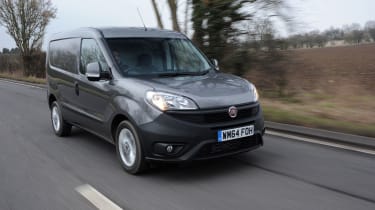
Electric vans
If you really want to slash fuel costs, then an electric van might be the answer. The Renault Kangoo ZE and Nissan e-NV200 are at the forefront of electric van tech, with both models offering a claimed range of 106 miles. That might not sound like much, but if you do lots of short, local journeys and have the ability to charge one overnight, then an electric van could be the way to go.
Is an electric van suitable for my business?
With the Government offering an £8,000 grant towards every electric van purchase, if the sums make sense, then now could be as good a time as any to take the plunge on electric power.
Fuel cards
Another way of managing costs is to sign up with a fuel card. These won't necessarily offer discounts on fuel costs, but you can manage your outgoings more easily with monthly payments, and you don't need to keep a wad of receipts for your records. It also means that you don't have to carry extra cash for fuel, because the card will have been paid for already with your monthly outgoings.
There are two kinds of fuel card, fixed price and pump price. Fixed price fuel cards give you a weekly pence per litre price, and that's what you pay, irrespective of the price at the fuel station you're using, and this is usually a couple of pence per litre less than the national average. Pump price cards are simpler, as you just pay the price listed at the petrol station.
• Best big panel vans to buy now
You can get fuel cards that are tied to petrol firms, which can have added benefits from loyalty card reward schemes, or there are fuel cards that allow you to purchase fuel at any petrol station you come across.
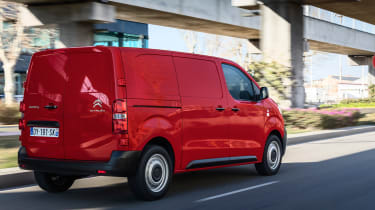
Servicing and maintenance
Long service intervals are a desirable feature for many high-mileage van users. Some makers offer two-year intervals with variable mileage limits, so that is something worth considering if you're doing lots of miles. In addition, many vans will have enough on-board electronics to keep an eye on the running gear, and let you know if any attention is needed.
For many business users, they want a van that will be reliable and be off the road for as short a time as possible. Go for makers such as Mercedes, Iveco and newcomer MAN, and their 24-hour truck service centres are available to light commercial vehicle users. All manufacturers are paying more attention to the specialist service they offer to van customers to it's worth checking if there's a van-specialist dealer nearby before deciding on a brand to purchase.
Other manufacturers will be willing to offer a courtesy van while yours is being serviced, while all makers offer some kind of maintenance plan that you can take out when you buy a new van. Some firms offer pay-as-you-go maintenance cover that's based on how many miles you do in a month, while van service and repair quotes are designed with a quick turnaround in mind.
Tax
Vans and pick-up trucks don't pay tax in the same way as private vehicles. Road tax and company costs are calculated as follows, although these rules only apply to new vans, as there are different regulations for older vehicles:
Road tax
Any commercial vehicle that weighs up to 3,500kg (3.5 tonnes) fully laden pays a flat rate for road tax of £230 a year. You can also pay £126.50 for six months' of road tax, and just like private vehicles, you can pay via Direct Debit to the DVLA.
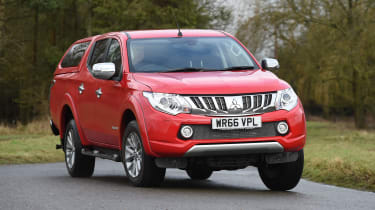
Benefit-in-Kind
Again, vans and pick-up trucks that weigh up to 3,500kg gross pay a flat rate for company tax. For the 2016/17 tax year, this stands at £3,170, so 20 per cent taxpayers face an annual bill of £634, while 40 per cent taxpayers have a bill of £1,268. These rates are for vans used on private journeys, though - if a van is just used for business, then this rate doesn't apply.
This is a complicated issue, and the best way to ensure your vehicle use is fully accounted for is to keep records of all journeys undertaken. If you do this, then it might spring up some benefits, such as if the vehicle is used infrequently, for example.
If you're looking at an electric van, then BIK rates have been reduced to encourage uptake. The rate is 20 per cent less than standard, so the flat rate is £634 for the whole year, rather than £3,170.
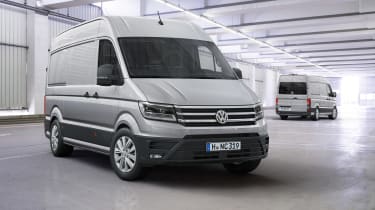
Insurance
Van insurance is something of a different beast to car insurance. You can still get the same kind of cover, with the bare minimum available being third party-only, but there are plenty of extras to consider on top of this.
Couriers will need additional cover for goods they are transporting, while business and commercial insurance is designed to cover the contents of your van. You can take out a social, domestic and pleasure policy, but this will leave you open to a financial loss should the contents of your van be stolen, as it only really covers your van for non-work driving. Legal expenses are another potential additional cost, and could be worthwhile if you do a high mileage, which will put you at greater exposure to possible collisions.
• Best car insurance companies
It really is worthwhile shopping around for the best insurance price possible. Take a step back and look at the kind of driving you do, bearing mind your annual mileage and the loads that you carry, because you could save money on a policy by removing parts of the policy that don't apply to you. And it will also be worthwhile looking at van security, as physical locks can help to reduce your outgoings, too.
What are your top tips for lowering your van costs? Let us know in the comments section...
Find a car with the experts

